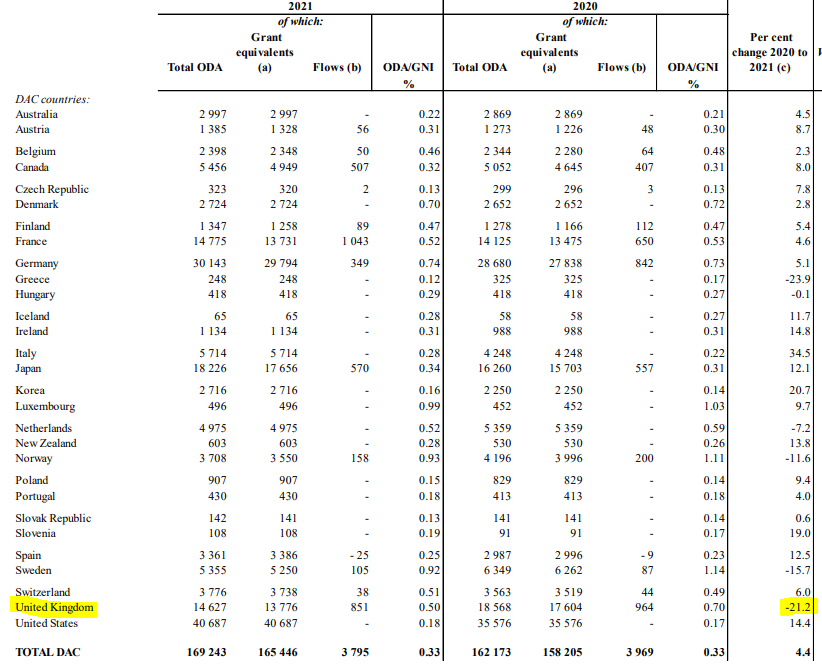The Shameful Implosion of UK Aid

Duncan Green looks at figures that reveal the damage done to the UK Aid programming.
I’ve been catching up on the news after a week away in Amman running the first pilot training session in our ‘Influencing for Senior Leaders’ course (huge fun, blogs to follow). Among the less enjoyable updates was the latest evidence for the wanton vandalism being inflicted on the UK’s aid programme.
Two sets of contrasting provisional stats for 2021 were published while I was away: the UK’s Provisional Statistics on International Development and the OECD DAC Preliminary ODA Levels.
According to a withering analysis by BOND, the British development NGO network, the UK government’s insistence on cutting the aid budget from 0.7% of GNI to 0.5% amounted to a £4.6bn aid cut in the middle of a pandemic. And the way it was cut made it much, much worse.
‘Cutting the budget by this much with so little notice, including cuts to existing programmes, undermines value for money, reduces transparency and disproportionately harms the most marginalised communities.’

Shame hidden in the small print
According to an analysis in Devex: ‘In 2021, aid spending to the African continent was cut by 39%, from £2.2 billion in 2020 to below £1.4 billion, and spending in Asia was cut by 32%, from nearly £1.6 billion in 2020 to less than £1.1 billion in 2020.
Two government departments were merged to create FCDO, but it appears that their portfolios didn’t wear the aid cuts equally. The figures showed “country specific bilateral funding formally under DFID’s portfolio bore the brunt of the cuts, whilst most areas formally under [the Foreign & Commonwealth Office] saw increases, as did spending within the UK by the Home and Cabinet Offices,” according to Richard Watts, a senior adviser on development finance at Save the Children UK.
£915 million went to the Home Office for spending in the U.K., nearly double the previous year. £100.4 million in donations of the U.K.’s excess COVID-19 vaccines were charged to the aid budget.’
So there we have it: UK aid took 20+ painstaking years to create, building a global reputation for thoughtful cooperation, largely free from the politicisation of previous years. Now it has been taken apart in a matter of months, hacking away at aid lifelines in order to hit the targets for cuts, shovelling money out the door to other government departments, dumping unwanted vaccines and charging them to the aid budget. Not surprising that so many former DFID staff have left (the abandonment of the former DFID offices compounded the sense of collapse).
A couple of (flimsy) straws to clutch at
Despite lots of concern that UK would use the aid budget to fund the horrible new Rwanda asylum programme, DevEx reported that “a Home Office spokesperson indicated that the aid budget is not going to be used to help pay for the Rwanda deal, adding that it will instead be supported by “new funding that comes from the Treasury.”
Secondly, non-government aspects of the UK ‘development complex’ are more or less intact. All the world’s top 5 University International Development departments are in the UK, according to the latest global ranking. Similarly big, influential NGOs and thinktanks are still hiring. But I do worry that a lot of this revolved around DFID/FCDO, and may start to wither on the vine, now the ideas and the funding have gone into freefall.
The surge in incompetence and miserliness in London contrasts with increased generosity of the rest of the world – aid increased in 23 out of the 29 donors covered by the OECD figures, and global aid spending rose to USD 178.9 billion, 4.4% up on 2020 figures, despite all the competing domestic demands of the pandemic – really an astonishing achievement.
Those figures include some contested accounting over whether/how to include Covid vaccines in aid budgets (‘Donors have thrown out the rule book by counting vaccine donations in aid budgets. Over 350 million vaccine doses came from hoarded stocks, some of which, were donated far too close to their expiry date.’ – Oxfam Press Release). But even excluding vaccines, global aid volumes rose slightly.
Looking forward, the panorama is if anything even more depressing – food prices surging around the world due to Russia’s invasion of Ukraine, a growing climate emergency, massive new refugee flows and a horribly under-funded emergency response in the Horn of Africa (the UN’s Somalia appeal has only raised 4% of the money it needs). And in the middle of all this, UK aid missing in action.
Not a good time to be a Brit. ☹
This first appeared on FP2P.
Photo by Nick Demou


